Tax Law
VerifiedAdded on 2023/06/13
|13
|2821
|486
AI Summary
This study material covers various aspects of Tax Law, including taxation laws, deductions, residency status, and more. It includes solved assignments, essays, and dissertations. The content discusses the Australian taxation office, tax agent requirements, provisions for deduction, residency status determination, and more.
Contribute Materials
Your contribution can guide someone’s learning journey. Share your
documents today.
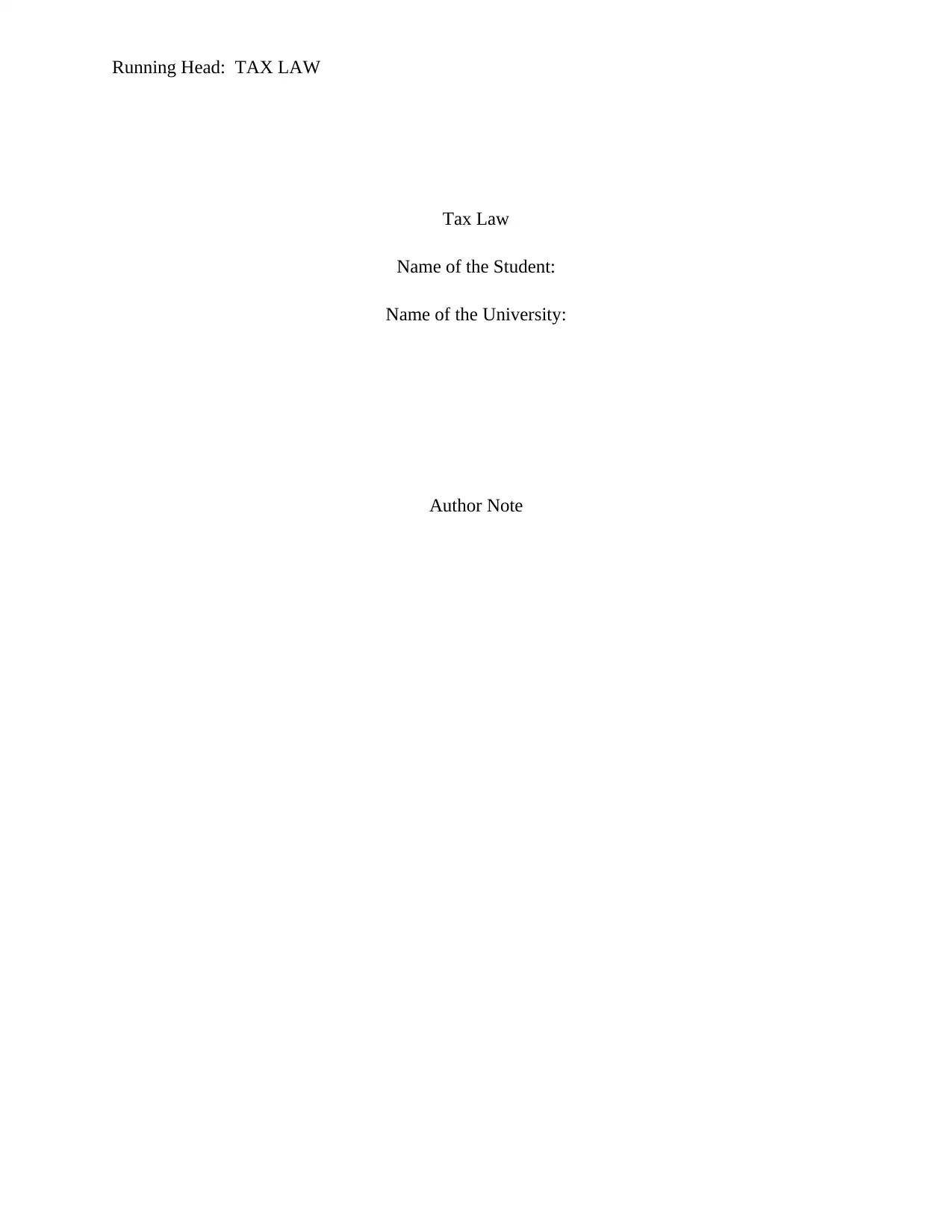
Running Head: TAX LAW
Tax Law
Name of the Student:
Name of the University:
Author Note
Tax Law
Name of the Student:
Name of the University:
Author Note
Secure Best Marks with AI Grader
Need help grading? Try our AI Grader for instant feedback on your assignments.
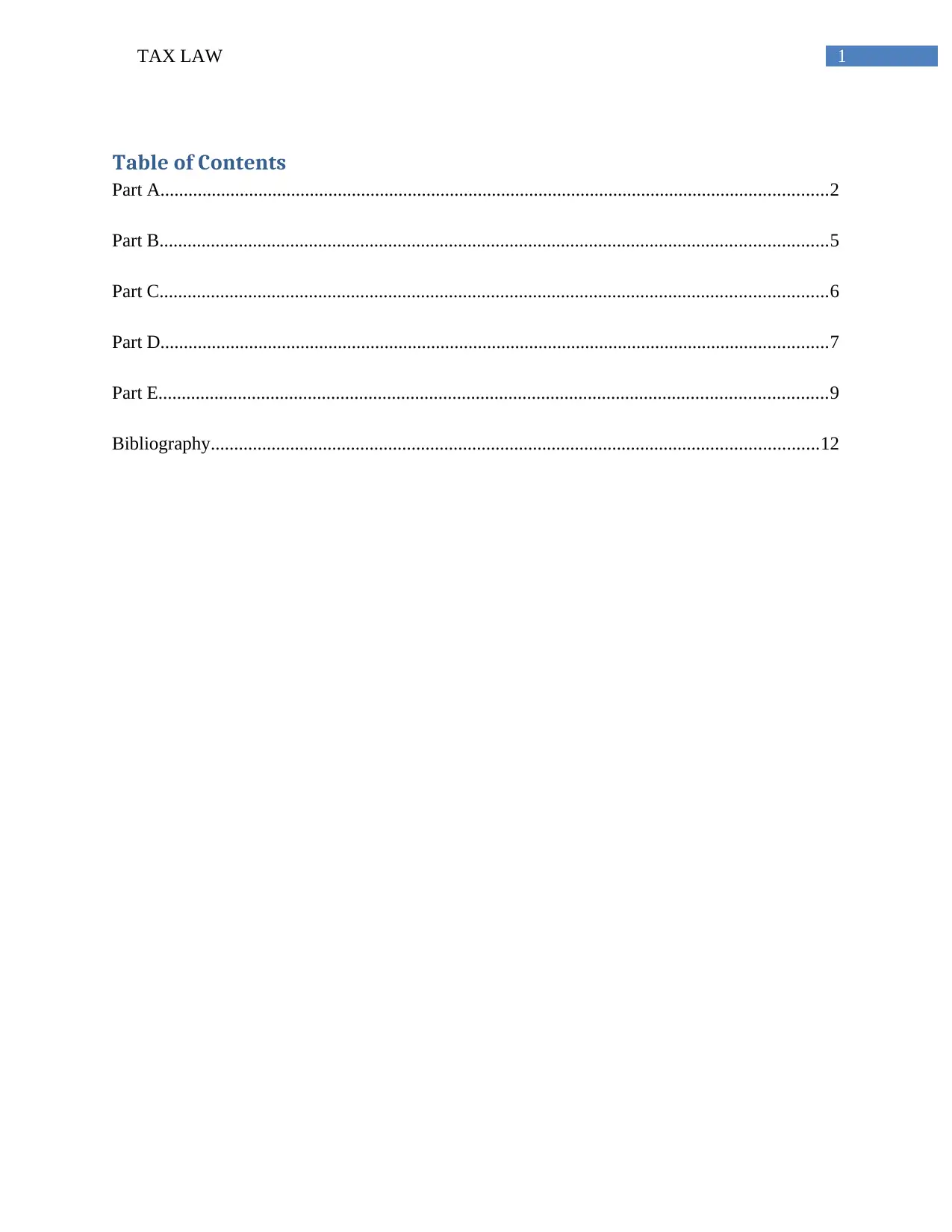
1TAX LAW
Table of Contents
Part A...............................................................................................................................................2
Part B...............................................................................................................................................5
Part C...............................................................................................................................................6
Part D...............................................................................................................................................7
Part E...............................................................................................................................................9
Bibliography..................................................................................................................................12
Table of Contents
Part A...............................................................................................................................................2
Part B...............................................................................................................................................5
Part C...............................................................................................................................................6
Part D...............................................................................................................................................7
Part E...............................................................................................................................................9
Bibliography..................................................................................................................................12
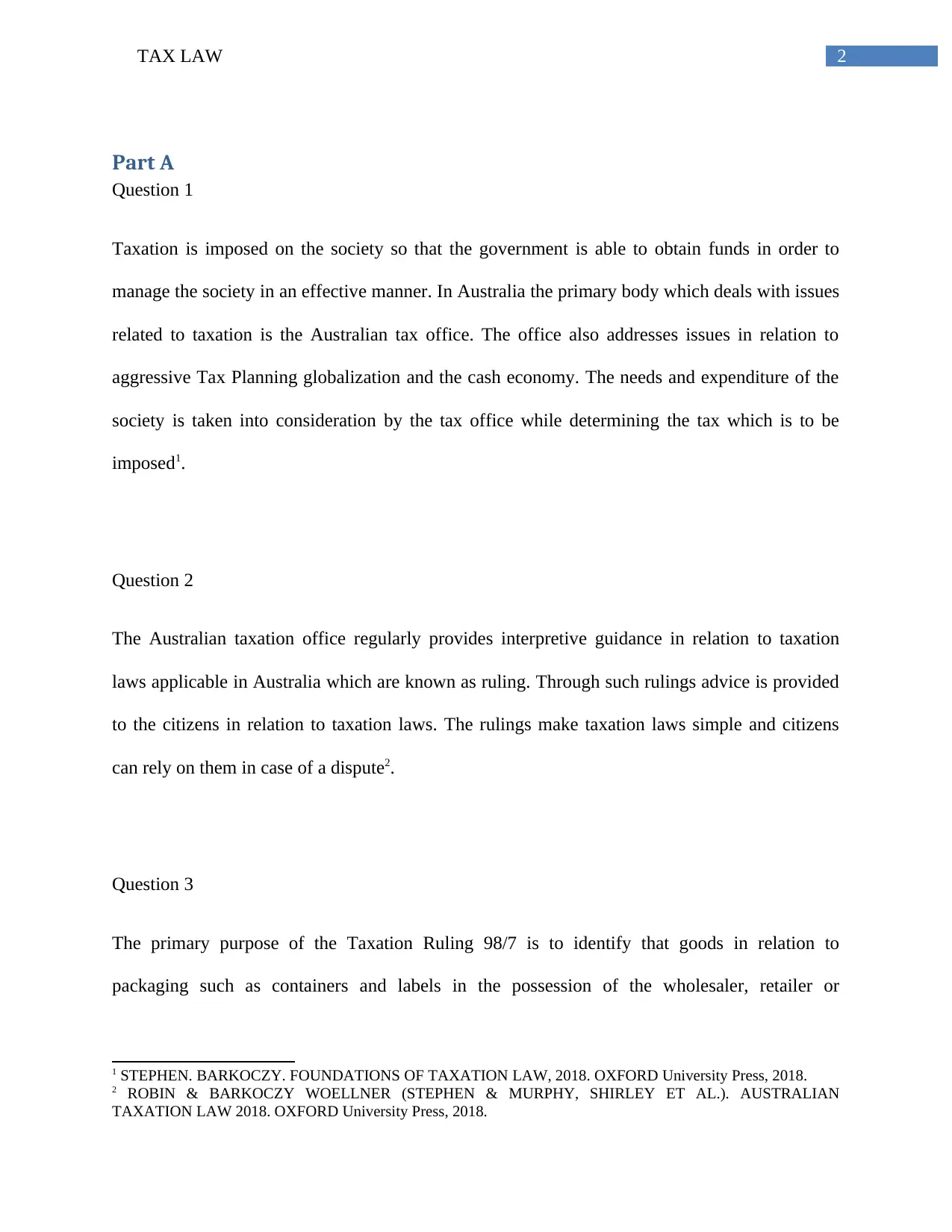
2TAX LAW
Part A
Question 1
Taxation is imposed on the society so that the government is able to obtain funds in order to
manage the society in an effective manner. In Australia the primary body which deals with issues
related to taxation is the Australian tax office. The office also addresses issues in relation to
aggressive Tax Planning globalization and the cash economy. The needs and expenditure of the
society is taken into consideration by the tax office while determining the tax which is to be
imposed1.
Question 2
The Australian taxation office regularly provides interpretive guidance in relation to taxation
laws applicable in Australia which are known as ruling. Through such rulings advice is provided
to the citizens in relation to taxation laws. The rulings make taxation laws simple and citizens
can rely on them in case of a dispute2.
Question 3
The primary purpose of the Taxation Ruling 98/7 is to identify that goods in relation to
packaging such as containers and labels in the possession of the wholesaler, retailer or
1 STEPHEN. BARKOCZY. FOUNDATIONS OF TAXATION LAW, 2018. OXFORD University Press, 2018.
2 ROBIN & BARKOCZY WOELLNER (STEPHEN & MURPHY, SHIRLEY ET AL.). AUSTRALIAN
TAXATION LAW 2018. OXFORD University Press, 2018.
Part A
Question 1
Taxation is imposed on the society so that the government is able to obtain funds in order to
manage the society in an effective manner. In Australia the primary body which deals with issues
related to taxation is the Australian tax office. The office also addresses issues in relation to
aggressive Tax Planning globalization and the cash economy. The needs and expenditure of the
society is taken into consideration by the tax office while determining the tax which is to be
imposed1.
Question 2
The Australian taxation office regularly provides interpretive guidance in relation to taxation
laws applicable in Australia which are known as ruling. Through such rulings advice is provided
to the citizens in relation to taxation laws. The rulings make taxation laws simple and citizens
can rely on them in case of a dispute2.
Question 3
The primary purpose of the Taxation Ruling 98/7 is to identify that goods in relation to
packaging such as containers and labels in the possession of the wholesaler, retailer or
1 STEPHEN. BARKOCZY. FOUNDATIONS OF TAXATION LAW, 2018. OXFORD University Press, 2018.
2 ROBIN & BARKOCZY WOELLNER (STEPHEN & MURPHY, SHIRLEY ET AL.). AUSTRALIAN
TAXATION LAW 2018. OXFORD University Press, 2018.
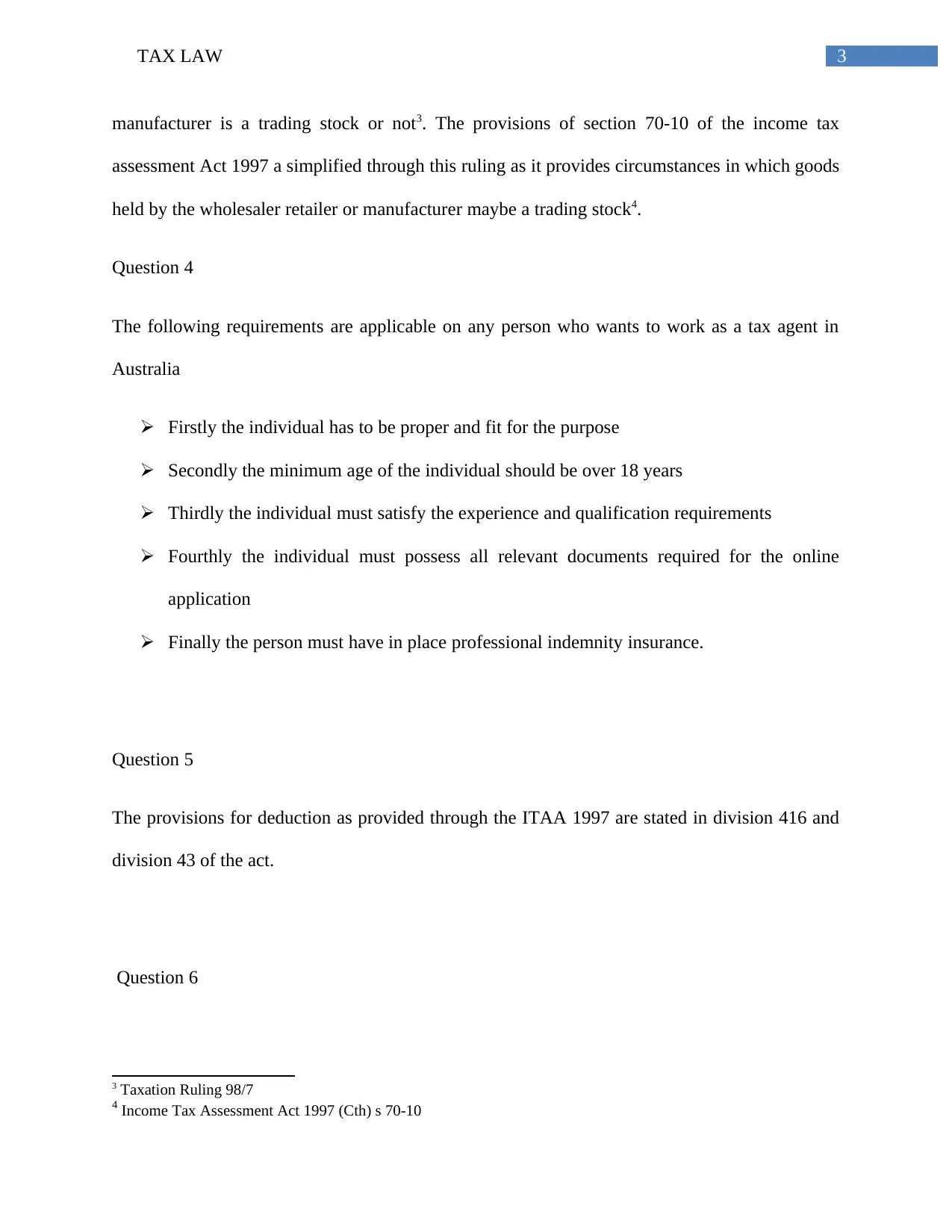
3TAX LAW
manufacturer is a trading stock or not3. The provisions of section 70-10 of the income tax
assessment Act 1997 a simplified through this ruling as it provides circumstances in which goods
held by the wholesaler retailer or manufacturer maybe a trading stock4.
Question 4
The following requirements are applicable on any person who wants to work as a tax agent in
Australia
Firstly the individual has to be proper and fit for the purpose
Secondly the minimum age of the individual should be over 18 years
Thirdly the individual must satisfy the experience and qualification requirements
Fourthly the individual must possess all relevant documents required for the online
application
Finally the person must have in place professional indemnity insurance.
Question 5
The provisions for deduction as provided through the ITAA 1997 are stated in division 416 and
division 43 of the act.
Question 6
3 Taxation Ruling 98/7
4 Income Tax Assessment Act 1997 (Cth) s 70-10
manufacturer is a trading stock or not3. The provisions of section 70-10 of the income tax
assessment Act 1997 a simplified through this ruling as it provides circumstances in which goods
held by the wholesaler retailer or manufacturer maybe a trading stock4.
Question 4
The following requirements are applicable on any person who wants to work as a tax agent in
Australia
Firstly the individual has to be proper and fit for the purpose
Secondly the minimum age of the individual should be over 18 years
Thirdly the individual must satisfy the experience and qualification requirements
Fourthly the individual must possess all relevant documents required for the online
application
Finally the person must have in place professional indemnity insurance.
Question 5
The provisions for deduction as provided through the ITAA 1997 are stated in division 416 and
division 43 of the act.
Question 6
3 Taxation Ruling 98/7
4 Income Tax Assessment Act 1997 (Cth) s 70-10
Secure Best Marks with AI Grader
Need help grading? Try our AI Grader for instant feedback on your assignments.
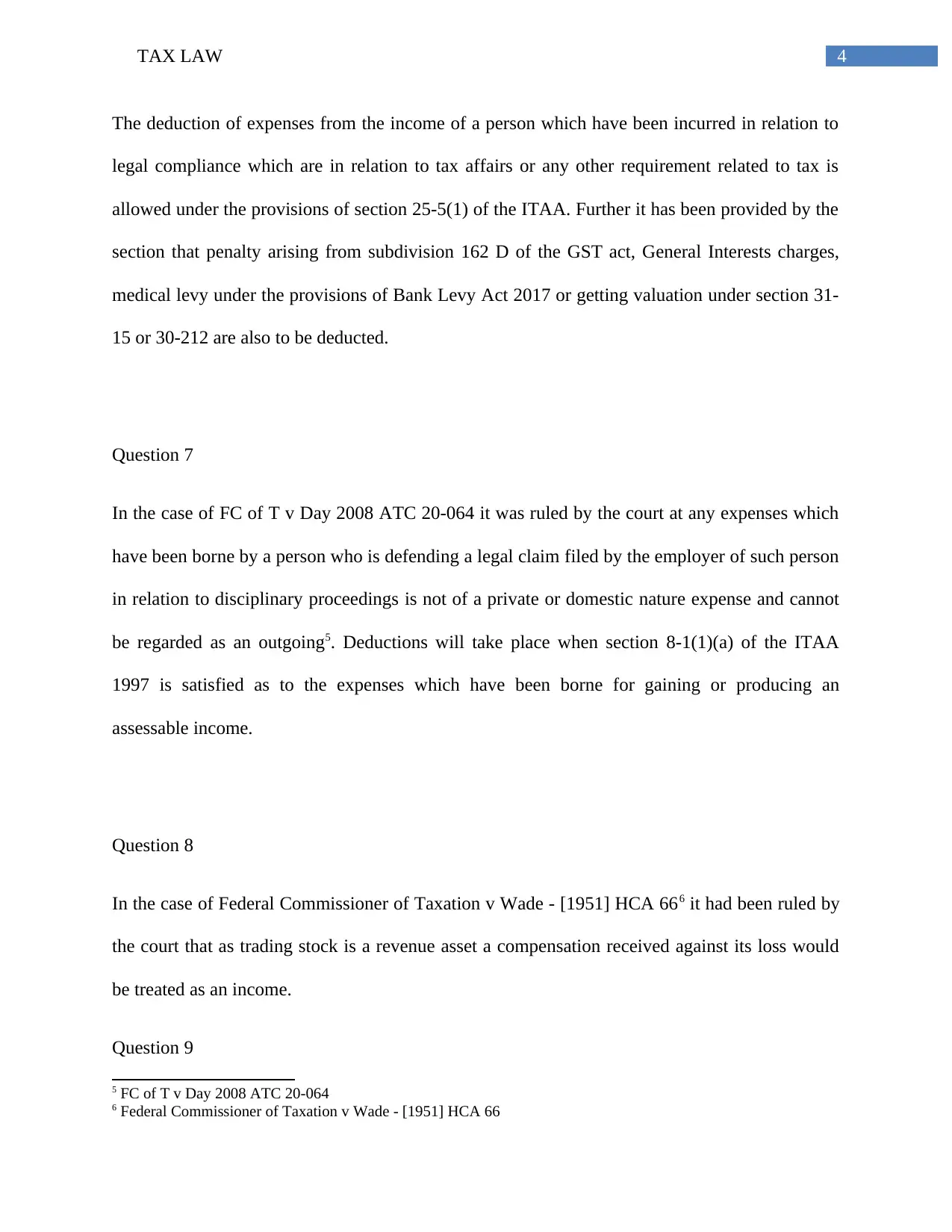
4TAX LAW
The deduction of expenses from the income of a person which have been incurred in relation to
legal compliance which are in relation to tax affairs or any other requirement related to tax is
allowed under the provisions of section 25-5(1) of the ITAA. Further it has been provided by the
section that penalty arising from subdivision 162 D of the GST act, General Interests charges,
medical levy under the provisions of Bank Levy Act 2017 or getting valuation under section 31-
15 or 30-212 are also to be deducted.
Question 7
In the case of FC of T v Day 2008 ATC 20-064 it was ruled by the court at any expenses which
have been borne by a person who is defending a legal claim filed by the employer of such person
in relation to disciplinary proceedings is not of a private or domestic nature expense and cannot
be regarded as an outgoing5. Deductions will take place when section 8-1(1)(a) of the ITAA
1997 is satisfied as to the expenses which have been borne for gaining or producing an
assessable income.
Question 8
In the case of Federal Commissioner of Taxation v Wade - [1951] HCA 666 it had been ruled by
the court that as trading stock is a revenue asset a compensation received against its loss would
be treated as an income.
Question 9
5 FC of T v Day 2008 ATC 20-064
6 Federal Commissioner of Taxation v Wade - [1951] HCA 66
The deduction of expenses from the income of a person which have been incurred in relation to
legal compliance which are in relation to tax affairs or any other requirement related to tax is
allowed under the provisions of section 25-5(1) of the ITAA. Further it has been provided by the
section that penalty arising from subdivision 162 D of the GST act, General Interests charges,
medical levy under the provisions of Bank Levy Act 2017 or getting valuation under section 31-
15 or 30-212 are also to be deducted.
Question 7
In the case of FC of T v Day 2008 ATC 20-064 it was ruled by the court at any expenses which
have been borne by a person who is defending a legal claim filed by the employer of such person
in relation to disciplinary proceedings is not of a private or domestic nature expense and cannot
be regarded as an outgoing5. Deductions will take place when section 8-1(1)(a) of the ITAA
1997 is satisfied as to the expenses which have been borne for gaining or producing an
assessable income.
Question 8
In the case of Federal Commissioner of Taxation v Wade - [1951] HCA 666 it had been ruled by
the court that as trading stock is a revenue asset a compensation received against its loss would
be treated as an income.
Question 9
5 FC of T v Day 2008 ATC 20-064
6 Federal Commissioner of Taxation v Wade - [1951] HCA 66
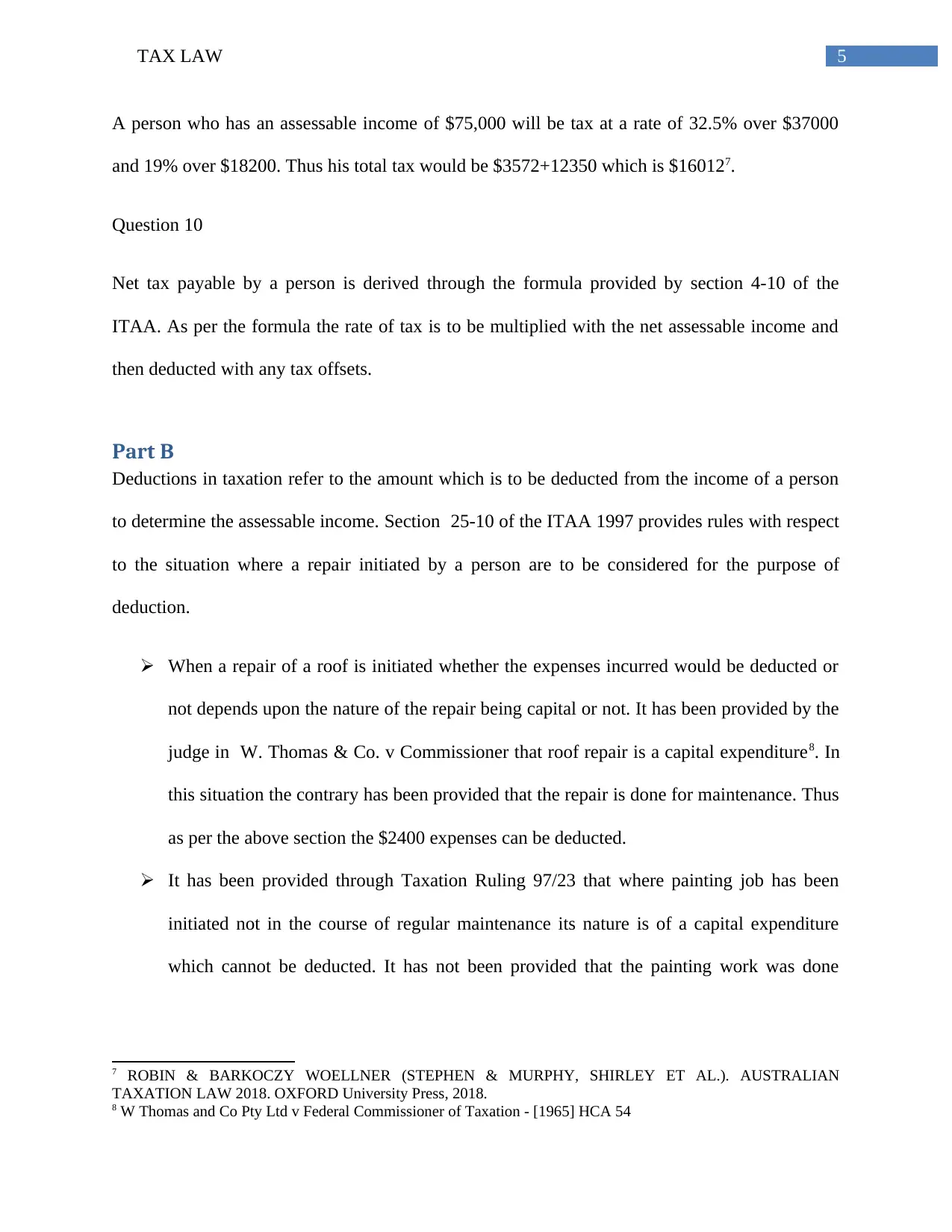
5TAX LAW
A person who has an assessable income of $75,000 will be tax at a rate of 32.5% over $37000
and 19% over $18200. Thus his total tax would be $3572+12350 which is $160127.
Question 10
Net tax payable by a person is derived through the formula provided by section 4-10 of the
ITAA. As per the formula the rate of tax is to be multiplied with the net assessable income and
then deducted with any tax offsets.
Part B
Deductions in taxation refer to the amount which is to be deducted from the income of a person
to determine the assessable income. Section 25-10 of the ITAA 1997 provides rules with respect
to the situation where a repair initiated by a person are to be considered for the purpose of
deduction.
When a repair of a roof is initiated whether the expenses incurred would be deducted or
not depends upon the nature of the repair being capital or not. It has been provided by the
judge in W. Thomas & Co. v Commissioner that roof repair is a capital expenditure8. In
this situation the contrary has been provided that the repair is done for maintenance. Thus
as per the above section the $2400 expenses can be deducted.
It has been provided through Taxation Ruling 97/23 that where painting job has been
initiated not in the course of regular maintenance its nature is of a capital expenditure
which cannot be deducted. It has not been provided that the painting work was done
7 ROBIN & BARKOCZY WOELLNER (STEPHEN & MURPHY, SHIRLEY ET AL.). AUSTRALIAN
TAXATION LAW 2018. OXFORD University Press, 2018.
8 W Thomas and Co Pty Ltd v Federal Commissioner of Taxation - [1965] HCA 54
A person who has an assessable income of $75,000 will be tax at a rate of 32.5% over $37000
and 19% over $18200. Thus his total tax would be $3572+12350 which is $160127.
Question 10
Net tax payable by a person is derived through the formula provided by section 4-10 of the
ITAA. As per the formula the rate of tax is to be multiplied with the net assessable income and
then deducted with any tax offsets.
Part B
Deductions in taxation refer to the amount which is to be deducted from the income of a person
to determine the assessable income. Section 25-10 of the ITAA 1997 provides rules with respect
to the situation where a repair initiated by a person are to be considered for the purpose of
deduction.
When a repair of a roof is initiated whether the expenses incurred would be deducted or
not depends upon the nature of the repair being capital or not. It has been provided by the
judge in W. Thomas & Co. v Commissioner that roof repair is a capital expenditure8. In
this situation the contrary has been provided that the repair is done for maintenance. Thus
as per the above section the $2400 expenses can be deducted.
It has been provided through Taxation Ruling 97/23 that where painting job has been
initiated not in the course of regular maintenance its nature is of a capital expenditure
which cannot be deducted. It has not been provided that the painting work was done
7 ROBIN & BARKOCZY WOELLNER (STEPHEN & MURPHY, SHIRLEY ET AL.). AUSTRALIAN
TAXATION LAW 2018. OXFORD University Press, 2018.
8 W Thomas and Co Pty Ltd v Federal Commissioner of Taxation - [1965] HCA 54
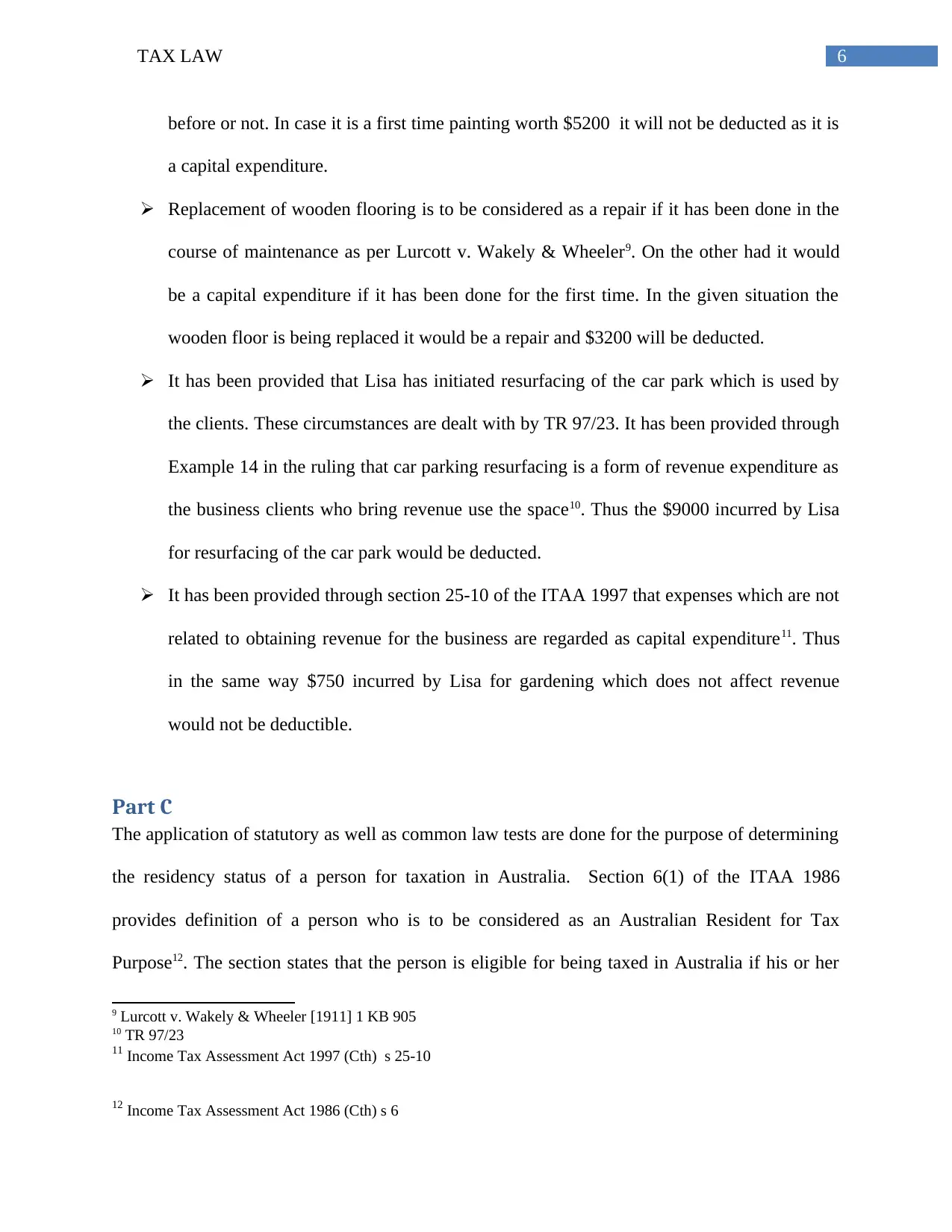
6TAX LAW
before or not. In case it is a first time painting worth $5200 it will not be deducted as it is
a capital expenditure.
Replacement of wooden flooring is to be considered as a repair if it has been done in the
course of maintenance as per Lurcott v. Wakely & Wheeler9. On the other had it would
be a capital expenditure if it has been done for the first time. In the given situation the
wooden floor is being replaced it would be a repair and $3200 will be deducted.
It has been provided that Lisa has initiated resurfacing of the car park which is used by
the clients. These circumstances are dealt with by TR 97/23. It has been provided through
Example 14 in the ruling that car parking resurfacing is a form of revenue expenditure as
the business clients who bring revenue use the space10. Thus the $9000 incurred by Lisa
for resurfacing of the car park would be deducted.
It has been provided through section 25-10 of the ITAA 1997 that expenses which are not
related to obtaining revenue for the business are regarded as capital expenditure11. Thus
in the same way $750 incurred by Lisa for gardening which does not affect revenue
would not be deductible.
Part C
The application of statutory as well as common law tests are done for the purpose of determining
the residency status of a person for taxation in Australia. Section 6(1) of the ITAA 1986
provides definition of a person who is to be considered as an Australian Resident for Tax
Purpose12. The section states that the person is eligible for being taxed in Australia if his or her
9 Lurcott v. Wakely & Wheeler [1911] 1 KB 905
10 TR 97/23
11 Income Tax Assessment Act 1997 (Cth) s 25-10
12 Income Tax Assessment Act 1986 (Cth) s 6
before or not. In case it is a first time painting worth $5200 it will not be deducted as it is
a capital expenditure.
Replacement of wooden flooring is to be considered as a repair if it has been done in the
course of maintenance as per Lurcott v. Wakely & Wheeler9. On the other had it would
be a capital expenditure if it has been done for the first time. In the given situation the
wooden floor is being replaced it would be a repair and $3200 will be deducted.
It has been provided that Lisa has initiated resurfacing of the car park which is used by
the clients. These circumstances are dealt with by TR 97/23. It has been provided through
Example 14 in the ruling that car parking resurfacing is a form of revenue expenditure as
the business clients who bring revenue use the space10. Thus the $9000 incurred by Lisa
for resurfacing of the car park would be deducted.
It has been provided through section 25-10 of the ITAA 1997 that expenses which are not
related to obtaining revenue for the business are regarded as capital expenditure11. Thus
in the same way $750 incurred by Lisa for gardening which does not affect revenue
would not be deductible.
Part C
The application of statutory as well as common law tests are done for the purpose of determining
the residency status of a person for taxation in Australia. Section 6(1) of the ITAA 1986
provides definition of a person who is to be considered as an Australian Resident for Tax
Purpose12. The section states that the person is eligible for being taxed in Australia if his or her
9 Lurcott v. Wakely & Wheeler [1911] 1 KB 905
10 TR 97/23
11 Income Tax Assessment Act 1997 (Cth) s 25-10
12 Income Tax Assessment Act 1986 (Cth) s 6
Paraphrase This Document
Need a fresh take? Get an instant paraphrase of this document with our AI Paraphraser
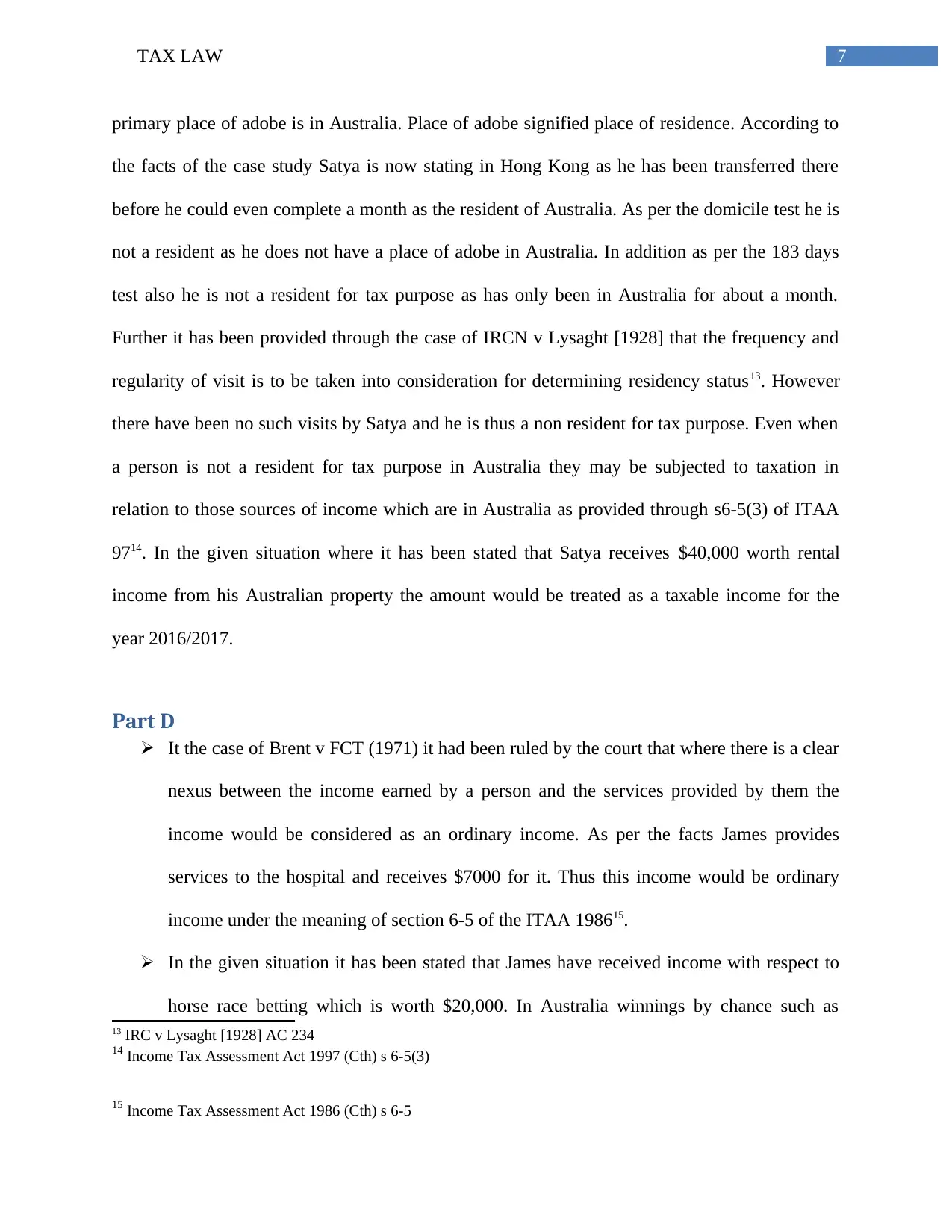
7TAX LAW
primary place of adobe is in Australia. Place of adobe signified place of residence. According to
the facts of the case study Satya is now stating in Hong Kong as he has been transferred there
before he could even complete a month as the resident of Australia. As per the domicile test he is
not a resident as he does not have a place of adobe in Australia. In addition as per the 183 days
test also he is not a resident for tax purpose as has only been in Australia for about a month.
Further it has been provided through the case of IRCN v Lysaght [1928] that the frequency and
regularity of visit is to be taken into consideration for determining residency status13. However
there have been no such visits by Satya and he is thus a non resident for tax purpose. Even when
a person is not a resident for tax purpose in Australia they may be subjected to taxation in
relation to those sources of income which are in Australia as provided through s6-5(3) of ITAA
9714. In the given situation where it has been stated that Satya receives $40,000 worth rental
income from his Australian property the amount would be treated as a taxable income for the
year 2016/2017.
Part D
It the case of Brent v FCT (1971) it had been ruled by the court that where there is a clear
nexus between the income earned by a person and the services provided by them the
income would be considered as an ordinary income. As per the facts James provides
services to the hospital and receives $7000 for it. Thus this income would be ordinary
income under the meaning of section 6-5 of the ITAA 198615.
In the given situation it has been stated that James have received income with respect to
horse race betting which is worth $20,000. In Australia winnings by chance such as
13 IRC v Lysaght [1928] AC 234
14 Income Tax Assessment Act 1997 (Cth) s 6-5(3)
15 Income Tax Assessment Act 1986 (Cth) s 6-5
primary place of adobe is in Australia. Place of adobe signified place of residence. According to
the facts of the case study Satya is now stating in Hong Kong as he has been transferred there
before he could even complete a month as the resident of Australia. As per the domicile test he is
not a resident as he does not have a place of adobe in Australia. In addition as per the 183 days
test also he is not a resident for tax purpose as has only been in Australia for about a month.
Further it has been provided through the case of IRCN v Lysaght [1928] that the frequency and
regularity of visit is to be taken into consideration for determining residency status13. However
there have been no such visits by Satya and he is thus a non resident for tax purpose. Even when
a person is not a resident for tax purpose in Australia they may be subjected to taxation in
relation to those sources of income which are in Australia as provided through s6-5(3) of ITAA
9714. In the given situation where it has been stated that Satya receives $40,000 worth rental
income from his Australian property the amount would be treated as a taxable income for the
year 2016/2017.
Part D
It the case of Brent v FCT (1971) it had been ruled by the court that where there is a clear
nexus between the income earned by a person and the services provided by them the
income would be considered as an ordinary income. As per the facts James provides
services to the hospital and receives $7000 for it. Thus this income would be ordinary
income under the meaning of section 6-5 of the ITAA 198615.
In the given situation it has been stated that James have received income with respect to
horse race betting which is worth $20,000. In Australia winnings by chance such as
13 IRC v Lysaght [1928] AC 234
14 Income Tax Assessment Act 1997 (Cth) s 6-5(3)
15 Income Tax Assessment Act 1986 (Cth) s 6-5
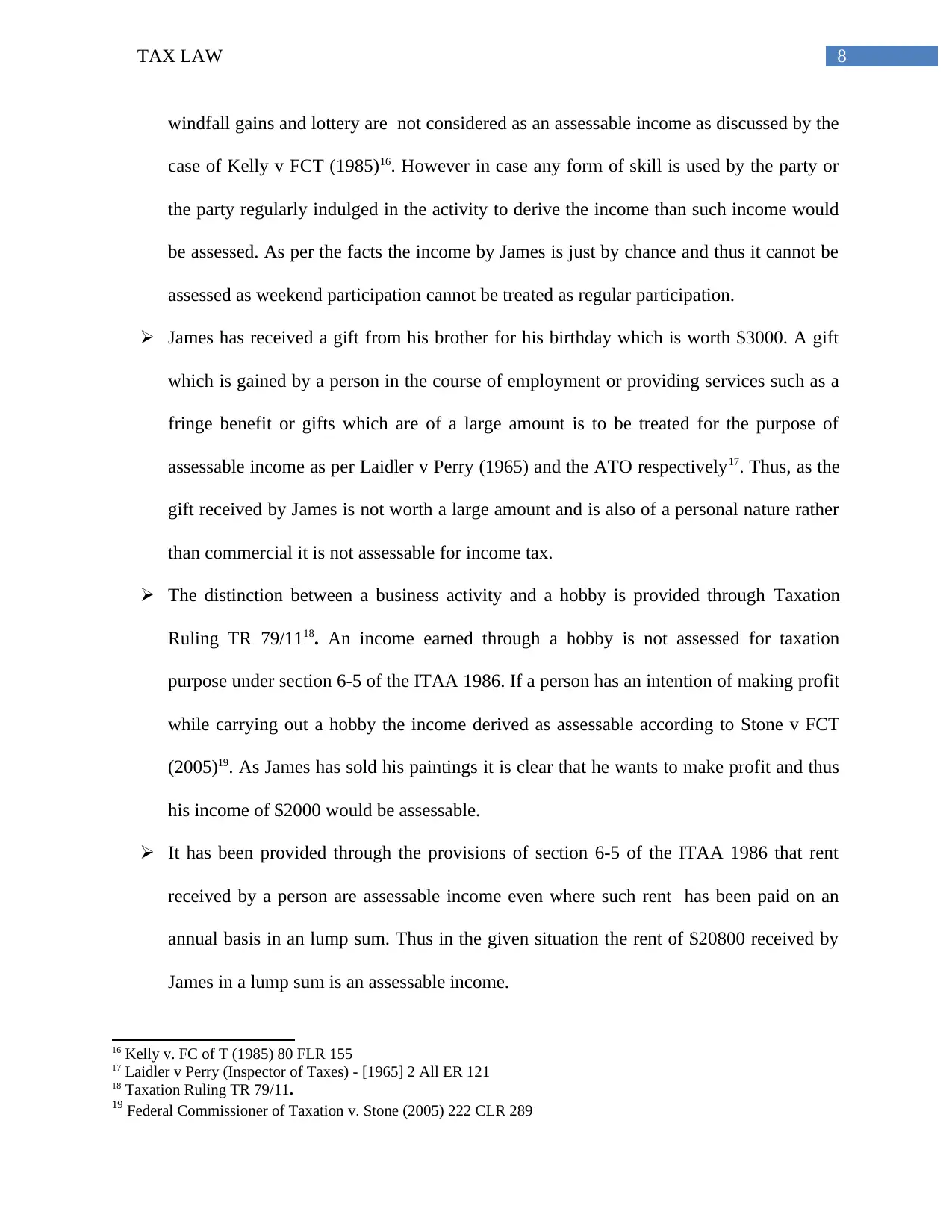
8TAX LAW
windfall gains and lottery are not considered as an assessable income as discussed by the
case of Kelly v FCT (1985)16. However in case any form of skill is used by the party or
the party regularly indulged in the activity to derive the income than such income would
be assessed. As per the facts the income by James is just by chance and thus it cannot be
assessed as weekend participation cannot be treated as regular participation.
James has received a gift from his brother for his birthday which is worth $3000. A gift
which is gained by a person in the course of employment or providing services such as a
fringe benefit or gifts which are of a large amount is to be treated for the purpose of
assessable income as per Laidler v Perry (1965) and the ATO respectively17. Thus, as the
gift received by James is not worth a large amount and is also of a personal nature rather
than commercial it is not assessable for income tax.
The distinction between a business activity and a hobby is provided through Taxation
Ruling TR 79/1118. An income earned through a hobby is not assessed for taxation
purpose under section 6-5 of the ITAA 1986. If a person has an intention of making profit
while carrying out a hobby the income derived as assessable according to Stone v FCT
(2005)19. As James has sold his paintings it is clear that he wants to make profit and thus
his income of $2000 would be assessable.
It has been provided through the provisions of section 6-5 of the ITAA 1986 that rent
received by a person are assessable income even where such rent has been paid on an
annual basis in an lump sum. Thus in the given situation the rent of $20800 received by
James in a lump sum is an assessable income.
16 Kelly v. FC of T (1985) 80 FLR 155
17 Laidler v Perry (Inspector of Taxes) - [1965] 2 All ER 121
18 Taxation Ruling TR 79/11.
19 Federal Commissioner of Taxation v. Stone (2005) 222 CLR 289
windfall gains and lottery are not considered as an assessable income as discussed by the
case of Kelly v FCT (1985)16. However in case any form of skill is used by the party or
the party regularly indulged in the activity to derive the income than such income would
be assessed. As per the facts the income by James is just by chance and thus it cannot be
assessed as weekend participation cannot be treated as regular participation.
James has received a gift from his brother for his birthday which is worth $3000. A gift
which is gained by a person in the course of employment or providing services such as a
fringe benefit or gifts which are of a large amount is to be treated for the purpose of
assessable income as per Laidler v Perry (1965) and the ATO respectively17. Thus, as the
gift received by James is not worth a large amount and is also of a personal nature rather
than commercial it is not assessable for income tax.
The distinction between a business activity and a hobby is provided through Taxation
Ruling TR 79/1118. An income earned through a hobby is not assessed for taxation
purpose under section 6-5 of the ITAA 1986. If a person has an intention of making profit
while carrying out a hobby the income derived as assessable according to Stone v FCT
(2005)19. As James has sold his paintings it is clear that he wants to make profit and thus
his income of $2000 would be assessable.
It has been provided through the provisions of section 6-5 of the ITAA 1986 that rent
received by a person are assessable income even where such rent has been paid on an
annual basis in an lump sum. Thus in the given situation the rent of $20800 received by
James in a lump sum is an assessable income.
16 Kelly v. FC of T (1985) 80 FLR 155
17 Laidler v Perry (Inspector of Taxes) - [1965] 2 All ER 121
18 Taxation Ruling TR 79/11.
19 Federal Commissioner of Taxation v. Stone (2005) 222 CLR 289
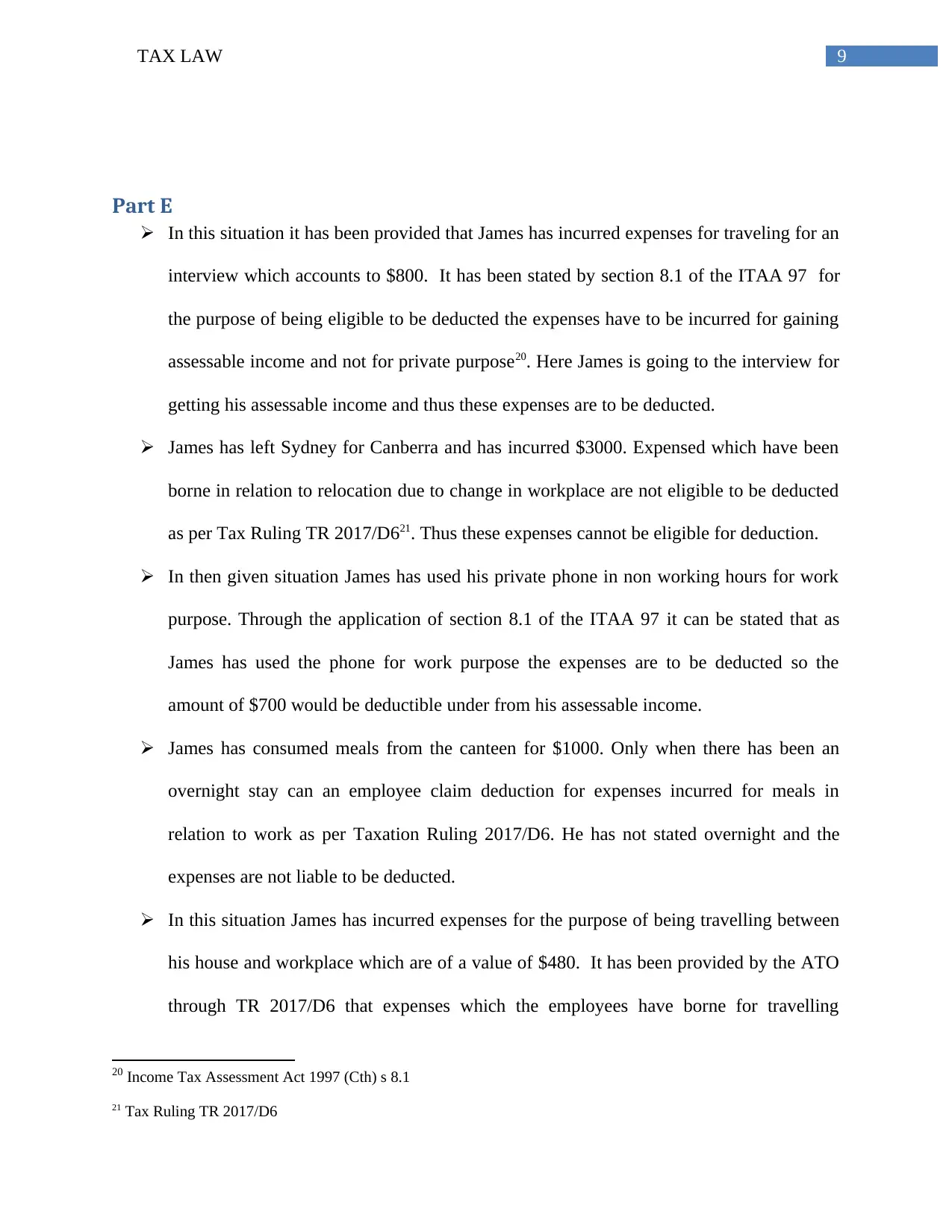
9TAX LAW
Part E
In this situation it has been provided that James has incurred expenses for traveling for an
interview which accounts to $800. It has been stated by section 8.1 of the ITAA 97 for
the purpose of being eligible to be deducted the expenses have to be incurred for gaining
assessable income and not for private purpose20. Here James is going to the interview for
getting his assessable income and thus these expenses are to be deducted.
James has left Sydney for Canberra and has incurred $3000. Expensed which have been
borne in relation to relocation due to change in workplace are not eligible to be deducted
as per Tax Ruling TR 2017/D621. Thus these expenses cannot be eligible for deduction.
In then given situation James has used his private phone in non working hours for work
purpose. Through the application of section 8.1 of the ITAA 97 it can be stated that as
James has used the phone for work purpose the expenses are to be deducted so the
amount of $700 would be deductible under from his assessable income.
James has consumed meals from the canteen for $1000. Only when there has been an
overnight stay can an employee claim deduction for expenses incurred for meals in
relation to work as per Taxation Ruling 2017/D6. He has not stated overnight and the
expenses are not liable to be deducted.
In this situation James has incurred expenses for the purpose of being travelling between
his house and workplace which are of a value of $480. It has been provided by the ATO
through TR 2017/D6 that expenses which the employees have borne for travelling
20 Income Tax Assessment Act 1997 (Cth) s 8.1
21 Tax Ruling TR 2017/D6
Part E
In this situation it has been provided that James has incurred expenses for traveling for an
interview which accounts to $800. It has been stated by section 8.1 of the ITAA 97 for
the purpose of being eligible to be deducted the expenses have to be incurred for gaining
assessable income and not for private purpose20. Here James is going to the interview for
getting his assessable income and thus these expenses are to be deducted.
James has left Sydney for Canberra and has incurred $3000. Expensed which have been
borne in relation to relocation due to change in workplace are not eligible to be deducted
as per Tax Ruling TR 2017/D621. Thus these expenses cannot be eligible for deduction.
In then given situation James has used his private phone in non working hours for work
purpose. Through the application of section 8.1 of the ITAA 97 it can be stated that as
James has used the phone for work purpose the expenses are to be deducted so the
amount of $700 would be deductible under from his assessable income.
James has consumed meals from the canteen for $1000. Only when there has been an
overnight stay can an employee claim deduction for expenses incurred for meals in
relation to work as per Taxation Ruling 2017/D6. He has not stated overnight and the
expenses are not liable to be deducted.
In this situation James has incurred expenses for the purpose of being travelling between
his house and workplace which are of a value of $480. It has been provided by the ATO
through TR 2017/D6 that expenses which the employees have borne for travelling
20 Income Tax Assessment Act 1997 (Cth) s 8.1
21 Tax Ruling TR 2017/D6
Secure Best Marks with AI Grader
Need help grading? Try our AI Grader for instant feedback on your assignments.
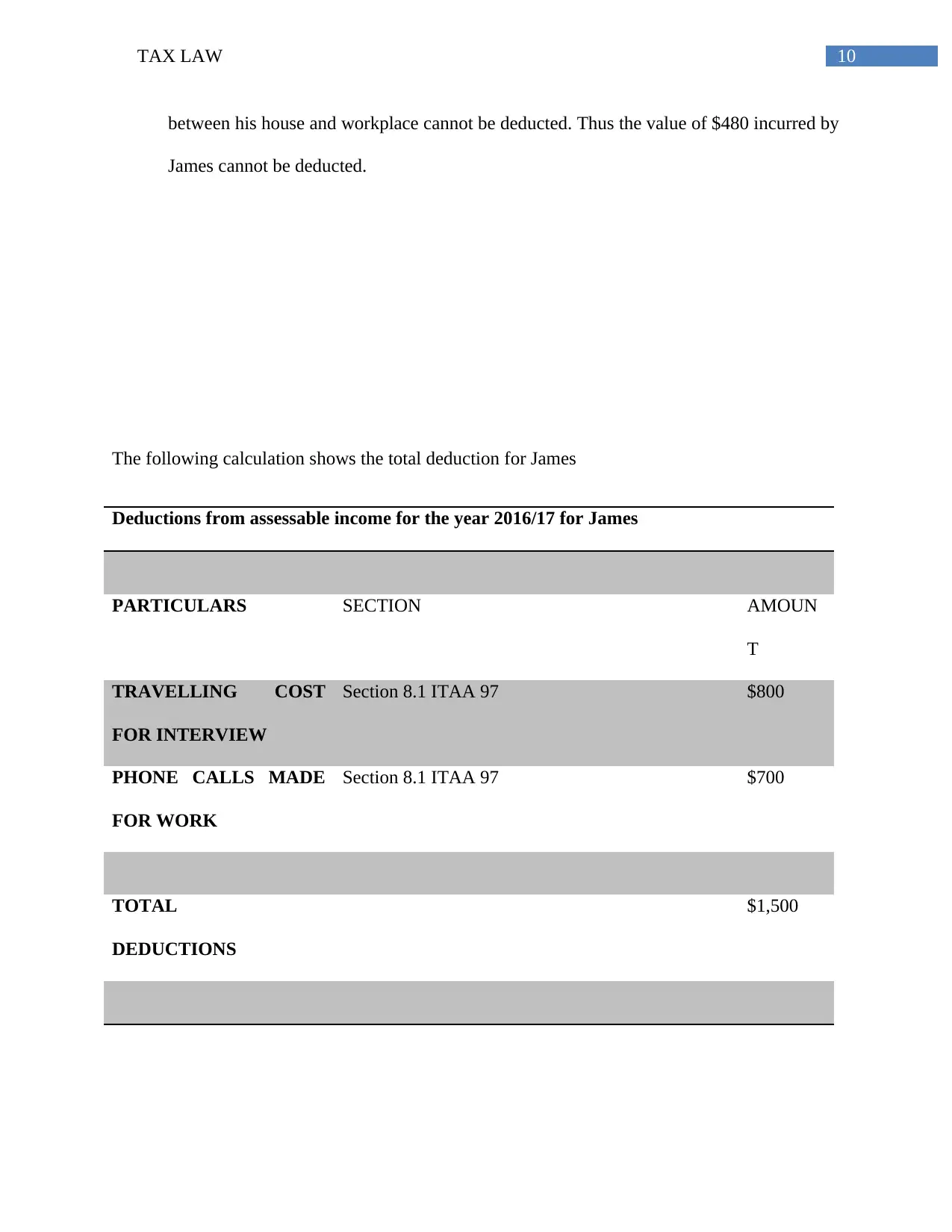
10TAX LAW
between his house and workplace cannot be deducted. Thus the value of $480 incurred by
James cannot be deducted.
The following calculation shows the total deduction for James
Deductions from assessable income for the year 2016/17 for James
PARTICULARS SECTION AMOUN
T
TRAVELLING COST
FOR INTERVIEW
Section 8.1 ITAA 97 $800
PHONE CALLS MADE
FOR WORK
Section 8.1 ITAA 97 $700
TOTAL
DEDUCTIONS
$1,500
between his house and workplace cannot be deducted. Thus the value of $480 incurred by
James cannot be deducted.
The following calculation shows the total deduction for James
Deductions from assessable income for the year 2016/17 for James
PARTICULARS SECTION AMOUN
T
TRAVELLING COST
FOR INTERVIEW
Section 8.1 ITAA 97 $800
PHONE CALLS MADE
FOR WORK
Section 8.1 ITAA 97 $700
TOTAL
DEDUCTIONS
$1,500
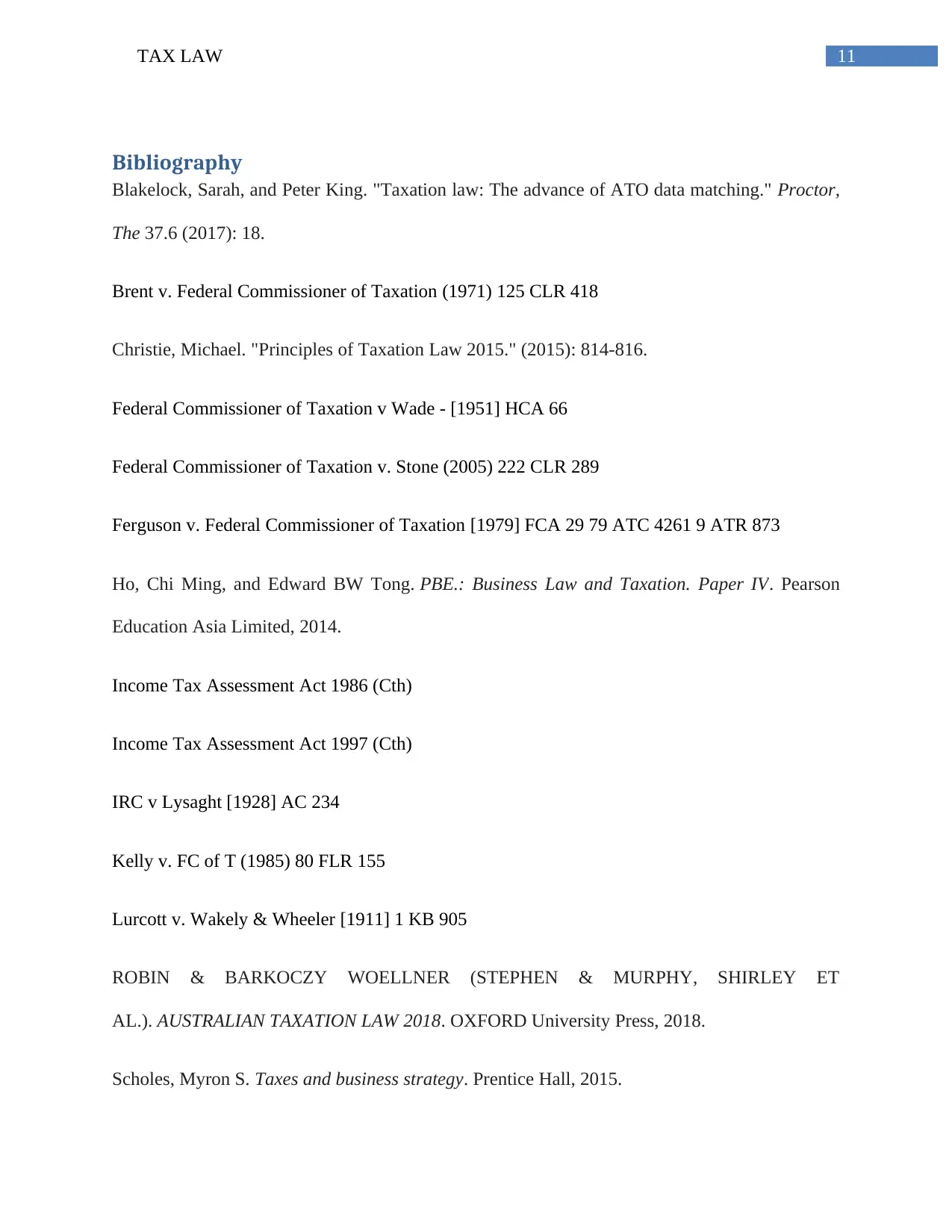
11TAX LAW
Bibliography
Blakelock, Sarah, and Peter King. "Taxation law: The advance of ATO data matching." Proctor,
The 37.6 (2017): 18.
Brent v. Federal Commissioner of Taxation (1971) 125 CLR 418
Christie, Michael. "Principles of Taxation Law 2015." (2015): 814-816.
Federal Commissioner of Taxation v Wade - [1951] HCA 66
Federal Commissioner of Taxation v. Stone (2005) 222 CLR 289
Ferguson v. Federal Commissioner of Taxation [1979] FCA 29 79 ATC 4261 9 ATR 873
Ho, Chi Ming, and Edward BW Tong. PBE.: Business Law and Taxation. Paper IV. Pearson
Education Asia Limited, 2014.
Income Tax Assessment Act 1986 (Cth)
Income Tax Assessment Act 1997 (Cth)
IRC v Lysaght [1928] AC 234
Kelly v. FC of T (1985) 80 FLR 155
Lurcott v. Wakely & Wheeler [1911] 1 KB 905
ROBIN & BARKOCZY WOELLNER (STEPHEN & MURPHY, SHIRLEY ET
AL.). AUSTRALIAN TAXATION LAW 2018. OXFORD University Press, 2018.
Scholes, Myron S. Taxes and business strategy. Prentice Hall, 2015.
Bibliography
Blakelock, Sarah, and Peter King. "Taxation law: The advance of ATO data matching." Proctor,
The 37.6 (2017): 18.
Brent v. Federal Commissioner of Taxation (1971) 125 CLR 418
Christie, Michael. "Principles of Taxation Law 2015." (2015): 814-816.
Federal Commissioner of Taxation v Wade - [1951] HCA 66
Federal Commissioner of Taxation v. Stone (2005) 222 CLR 289
Ferguson v. Federal Commissioner of Taxation [1979] FCA 29 79 ATC 4261 9 ATR 873
Ho, Chi Ming, and Edward BW Tong. PBE.: Business Law and Taxation. Paper IV. Pearson
Education Asia Limited, 2014.
Income Tax Assessment Act 1986 (Cth)
Income Tax Assessment Act 1997 (Cth)
IRC v Lysaght [1928] AC 234
Kelly v. FC of T (1985) 80 FLR 155
Lurcott v. Wakely & Wheeler [1911] 1 KB 905
ROBIN & BARKOCZY WOELLNER (STEPHEN & MURPHY, SHIRLEY ET
AL.). AUSTRALIAN TAXATION LAW 2018. OXFORD University Press, 2018.
Scholes, Myron S. Taxes and business strategy. Prentice Hall, 2015.
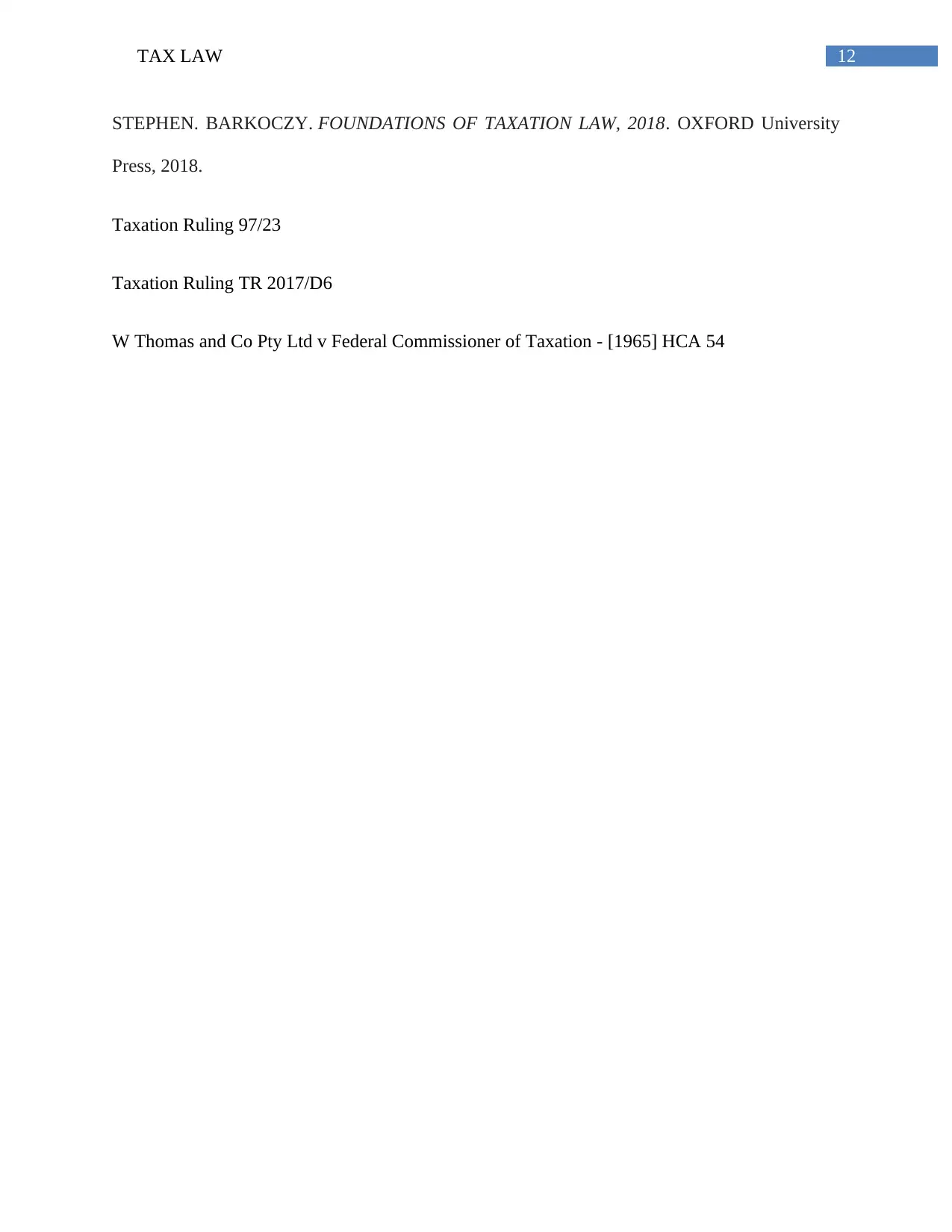
12TAX LAW
STEPHEN. BARKOCZY. FOUNDATIONS OF TAXATION LAW, 2018. OXFORD University
Press, 2018.
Taxation Ruling 97/23
Taxation Ruling TR 2017/D6
W Thomas and Co Pty Ltd v Federal Commissioner of Taxation - [1965] HCA 54
STEPHEN. BARKOCZY. FOUNDATIONS OF TAXATION LAW, 2018. OXFORD University
Press, 2018.
Taxation Ruling 97/23
Taxation Ruling TR 2017/D6
W Thomas and Co Pty Ltd v Federal Commissioner of Taxation - [1965] HCA 54
1 out of 13
Related Documents
Your All-in-One AI-Powered Toolkit for Academic Success.
+13062052269
info@desklib.com
Available 24*7 on WhatsApp / Email
![[object Object]](/_next/static/media/star-bottom.7253800d.svg)
Unlock your academic potential
© 2024 | Zucol Services PVT LTD | All rights reserved.




